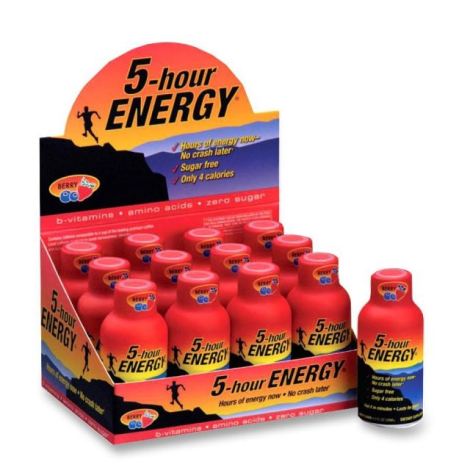A Bad Interview: The Wrong Kind Of (5-Hour) Energy
Bottles of 5-Hour Energy — powerful two-ounce shots of caffeine — are virtually ubiquitous, loved by many consumers for keeping them awake for late-night partying, overnight studying, or long days at the office.
But the product may not be all good. According to The New York Times:
“Federal officials have received reports of 13 deaths over the last four years that cited the possible involvement of 5-Hour Energy, a highly caffeinated energy shot, according to Food and Drug Administration records and an interview with an agency official.”
“Since 2009, 5-Hour Energy has been mentioned in some 90 filings with the F.D.A., including more than 30 that involved serious or life-threatening injuries like heart attacks, convulsions and, in one case, a spontaneous abortion.”

Read the language in that article closely, and you’ll see why the company’s CEO and Founder, Manoj Bhargava, is frustrated. The company is being associated with more than a dozen deaths, but the best the FDA could do is cite the product’s “possible involvement” in those cases, in which the product “has been mentioned.” Not exactly a smoking gun.
Consumer Reports found that an average bottle of 5-Hour Energy has about 215 milligrams of caffeine—less than a 12-ounce cup of Starbucks coffee. Given that context, I can understand why the company’s founder felt unfairly maligned when discussing the FDA’s report on Fox News late last week:
Mr. Bhargava made some good points during the interview. Comparing the caffeine count in his product to that of a cup of Starbucks coffee, for example, provided viewers with useful information. And his analogy to a bottle of water being “linked” to deaths also demonstrated the weakness of the case against his product.
But his tone was lousy, and he violated at least two of the “seven rules of a crisis,” notably numbers five (“your response needs to be about the victims”) and six (“facts are not enough.”)
In just three minutes, Mr. Bhargava lashed out at The New York Times, reporters in general (who have “no clue about what caffeine does”), and some of the victims (“folks trying to collect some money”). It’s possible that Bhargava is right on all of those facts. But his unfeeling and arrogant tone made it difficult to root for him.
Plus, he entirely forgot about a critical target audience – his customers. It’s easy to imagine that even his most loyal customers might be concerned about the news reports they’re seeing. But instead of using the interview to reassure his customer base, he focused almost exclusively on dismissing his critics. It’s easy to get blinded by righteous indignation during a crisis, but it’s rarely a good approach.
In future interviews, he should be more careful to respect the victims (or alleged victims) of his product. He’ll gain more traction with the home audience by extending sympathy for families who lost loved ones than he will by attacking them—and no, that’s not the same as accepting responsibility for their deaths.
Bhargava needs to remember that the audience needs to like him before they can hear him—and based on that interview, I’m guessing they’re not hearing him as well as they should.
A grateful tip of the hat to reader Bruce Pfaff for sending me this link.
What do you think? Please leave your thoughts in the comments section below.



Brad,
I see Bharghava interviewed by CBS News’ medical correspondent and there, he refused to give an exact number of milligrams of caffeine in the drink, even though the reporter asked him repeatedly. It made it like he was hiding something.
Deborah
…and he also alienated people who DO actually know about caffeine and its risks. It is not a harmless substance, and it’s ridiculous to portray it as such.
I’ve never used this product, and I sure as hell will never use it now.
There’s a TV commercial in which a blonde woman strums on a guitar and sings that if you buy 5-Hour Energy, a part of it will go to breast cancer research. I was surprised to see any nonprofit associated with this drink.